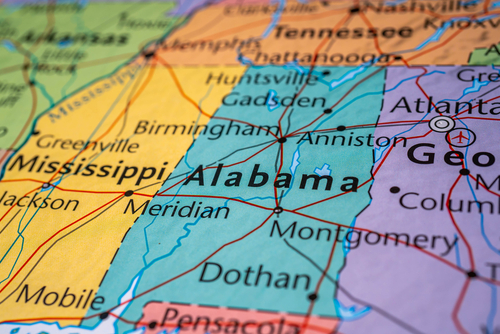Supreme Court rejects Alabama's bid to avoid crafting second Black-opportunity voting district

“These shameful, odious efforts to diminish the rightful voting power of Black Alabamians have finally been defeated,” said former U.S. Attorney General Eric H. Holder Jr. Image from Shutterstock.
Updated: The U.S. Supreme Court on Tuesday refused to stay a decision finding that Alabama had defied court opinions when it failed to create a second Black-opportunity congressional district.
The high court rejected Alabama’s emergency request in brief orders (here and here) in consolidated cases.
CNN, the Washington Post and the New York Times have coverage.
The Supreme Court had struck down an Alabama voting map in June that gave Black voters the power to elect their preferred candidate in only one of seven redrawn districts—despite making up 27% of the state’s population. The Supreme Court said Alabama’s map violated Section 2 of the Voting Rights Act.
The June decision upheld a three-judge panel, which held that Alabama should adopt a second congressional district “in which Black voters either comprise a voting-age majority or something quite close to it.”
After going back to the drawing board, Alabama created a second district in which the percentage of Black voters was about 40%. In a Sept. 5 opinion, the three-judge panel said Alabama had not complied with its earlier decision.
“We are not aware of any other case in which a state legislature—faced with a federal court order declaring that its electoral plan unlawfully dilutes minority votes and requiring a plan that provides an additional opportunity district—responded with a plan that the state concedes does not provide that district,” the panel said in its latest opinion.
The National Redistricting Foundation and the American Civil Liberties Union praised the Supreme Court’s latest action in press releases here and here.
The National Redistricting Foundation provides financial support and litigation strategy for plaintiffs in one of the cases before the Supreme Court, Allen v. Caster. The ACLU represents plaintiffs in the second case, Allen v. Milligan, along with other organizations and law firms.
Former U.S. Attorney General Eric H. Holder Jr., chair of the National Democratic Redistricting Committee, called the Supreme Court action a victory in the National Redistricting Foundation’s press release.
“These shameful, odious efforts to diminish the rightful voting power of Black Alabamians have finally been defeated,” Holder said. “As a result, we will see more representative maps in places that were once thought to be unreachable in the fight for fairness: Alabama, Louisiana and Georgia. Justice has prevailed.”
ABA President Mary Smith commented on the decision in a Sept. 26 press release.
“The American Bar Association staunchly applauds today’s Supreme Court decision to reject Alabama’s effort to conduct the 2024 elections under a contentious congressional map that dilutes the voting power of its Black citizens,” Smith said. “Today’s ruling not only signifies a judicial commitment to uphold civil rights and voting protections but reaffirms the lower court’s previous opinion that the redistricting likely constitutes a violation of the Voting Rights Act by the Alabama legislature.”
“The ABA stands unwaveringly for equitable redistricting and full civic participation in the creation of congressional and legislative districts,” Smith added. “The ABA is steadfast in its enduring commitment to the rule of law and democratic values and continues to advocate for fair representation and the elimination of biased practices in electoral processes. It is paramount that our legislative framework safeguards the essence of democracy and upholds the sanctity of each citizen’s vote.”
Updated Sept. 27 at 8:05 a.m. to include the statement from ABA President Mary Smith.
Write a letter to the editor, share a story tip or update, or report an error.



